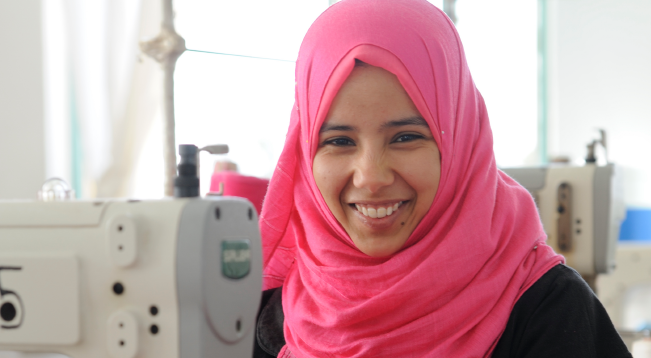
Regional Economic Empowerment of Women Project, Lebanon 2010 - 2014
Intervention
The Regional Economic Empowerment of Women Project focused on promoting Women’s Economic Empowerment through value chain promotion in Jordan, Lebanon, The Palestinian Territories and Tunisia. It was part of EconoWin – a regional GIZ programme improving the conditions for economic integration of women.
Partners
GIZ, Oxfam-Québec, Nature Tex, JRF and IRADA Foundation, AMAPPE, AIDES, APEX and Atlas Foundation.
Key Results
- 85% of the women involved had seen a rise in their levels of self-confidence with regard to their production activities
- 77% of women entrepreneurs felt that their status within the communities had been significantly enhanced
The Regional Economic Empowerment of Women Project (REEWP) has developed and implemented a unique participatory and gender-sensitive value chain approach, which contributed significantly to the project’s success in empowering women to work in higher echelons of value chains.
You may also view this case study as a downloadable pdf.
In the Middle East and North Africa, the rate of women’s participation in the economy is the lowest in the world. Nevertheless, many examples and empirical evidence prove that when women work and participate in professional life, the economy of a country grows; its society becomes more equitable.
The position of women in value chains
A value chain analysis typically considers both the individual stages in the production of a good or service, as well as the vertical and horizontal linkages between the various stakeholders involved. It takes into account the socioeconomic relationships between the stakeholders involved and the power relations that may influence their access to markets or their negotiating position.
Although both women and men are involved in most value chains, as entrepreneurs, employees, producers and consumers, women are more likely to be found in the less productive and less lucrative stages of value creation. Furthermore, they have fewer opportunities than men to improve their income or their negotiating power. In the Middle East and North Africa (MENA) region, many women work in the informal sector and their work therefore often goes unrecognised and is poorly paid. Greater future female integration at every value chain stage is crucial for women to gain ownership and become active in promoting economic growth in the MENA.
The gender-sensitive value chain approach
To improve the position of women in the value chain, REEWP introduced the gender-sensitive value chain (GSVC) approach. The approach consists of 10 individual steps, including sector scoping, GSVC analysis, and the implementation of short-term and mid-term initiatives. The GSVC approach’s aims are to make women’s work visible and upgrade it, and to improve women’s access to resources. It is designed to be uniquely participatory, transparent and inclusive across hierarchies involving representatives from individual producers, cooperatives, companies and public entities. The wider community and men specifically are involved from the start to ensure acceptance of women’s strengthened economic role and to avoid backlash.
When women work, economies win.
Value chain promotion
Seven value chains were selected to implement the GSVC approach, including dairy processing in Jordan, figs and prickly pears in Moroccoand myrtle in Tunisia. Local partners were trained to carry out an in-depth GSVC analysis for their own sectors. The analysis provided deeper insight into the role of women in the production process, about their power and their position in value chains as well as their access to and control over resources and services. A key success factor of the GSVC analysis was the use of a mixed approach, which involved external experts and local experts and stakeholders. This ensured the information gained could serve as an important basis for decision-making regarding promotional measures and incentive systems. Based on the results, ‘quick win’ measures and, at a later stage, mediumterm initiatives were designed to improve WEE in these sectors, ranging from accounting skill-building to formalisation of cooperatives. As a result of these initiatives, 64% of women beneficiaries reported an increase or expected increase in sales. Additionally, a majority of women surveyed stated that their self-confidence in relation to their place in working life, in their local community and in their family had increased and that, overall, their self-esteem had also risen.
An understanding of gender-specific roles within a value chain is not only important for the explicit empowerment of women; taking account of gender-specific characteristics and using gender-appropriate and adapted measures where necessary helps to achieve better overall results in value chain promotion.